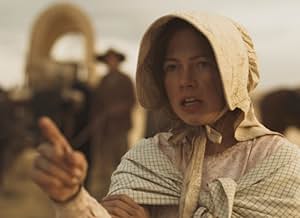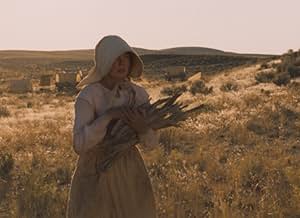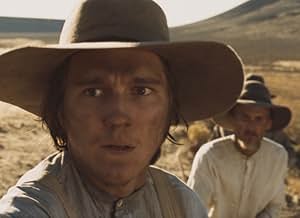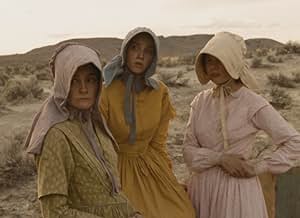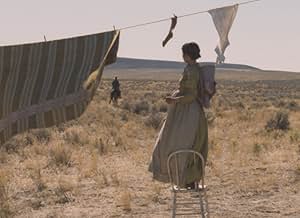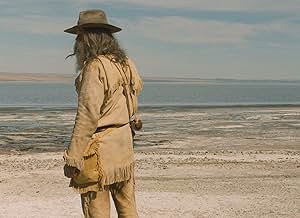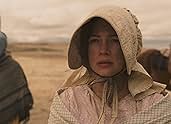CALIFICACIÓN DE IMDb
6.5/10
16 k
TU CALIFICACIÓN
Unos colonos que viajan a través del desierto de Oregón en 1845 se encuentran perdidos en pésimas condiciones.Unos colonos que viajan a través del desierto de Oregón en 1845 se encuentran perdidos en pésimas condiciones.Unos colonos que viajan a través del desierto de Oregón en 1845 se encuentran perdidos en pésimas condiciones.
- Premios
- 7 premios ganados y 14 nominaciones en total
- Dirección
- Guionista
- Todo el elenco y el equipo
- Producción, taquilla y más en IMDbPro
Opiniones destacadas
Its unorthodox – 'revisionist' – take on the Western will stimulate more debate than the story itself. It's sure to be praised for its presumed artistic qualities, but I watch Westerns for their brio and sense of fun, never as art.
My verdict is that 'Meek's Cutoff' is slow – definitely slow and not 'well-paced' – desultory and monotonous. And yet every time the film was on the cusp of being disengaging, it did something to regain my attention. I saw the film twice and still couldn't decide what it was about. This is a film of suggestion. We're responsible for how the story ends.
After a wordless opening, we encounter a motley crew, some Irish but mostly American. They're being escorted, along with their few wagons, donkeys, horses and oxen, across the beautiful and baleful Oregon plains to a valley, where we assume they will settle. Their escort is Stephen Meek (Bruce Greenwood), a loquacious, over-friendly cowboy, who has a tacit propensity for violence.
An etching by one of the band (prolific youngster Paul Dano) on a dead tree updates us on their progress: 'Lost' (something inhabitants never are in Westerns; their sense of geography is always mind-bogglingly good). They've been travelling for several days in the wrong direction and are in desperate need of water. Meek insists they will reach their destination soon.
Film factotum Kelly Reichardt, here director and editor, keeps us in the dark for much of the film. The camera pans back when there is conversation. What dialogue we do hear is muffled and limited (or incomprehensible when spoken by Meek). It's like we're eavesdropping and aren't supposed to know something.
A solitary Native American is spotted. His presence in these deathly quiet lands frightens the band. He is captured by Meek and Solomon Tetherow (Will Patton). Some argue that he will lead them to more Indians, so should be killed; but Solomon reasons that he can be used to lead them to water and their destination.
The band continues their voyage, taking 'The Indian' with them. Still nothing happens. Gradually, an ominous sense creeps in, made palpable by Jeff Grace's eerie score and Chris Blauvelt's atmospheric cinematography. (Both men have played second fiddle on big films, but show their competence as lead fiddlers here.) Suddenly the possibilities abound. Is that a smile 'The Indian' affects when one of the wagons is demolished? Does he plan to ambush them? Will the band ever reach the valley?
Apart from film students and die-hard Western fans, I can't tell who to recommend this critically acclaimed film to. I found the vistas beautiful to behold and I appreciated the tranquility. There's a faintly mystical quality. But I found it plodding and I can't forgive the ending, which I thought was criminally abrupt.
www.scottishreview.net
My verdict is that 'Meek's Cutoff' is slow – definitely slow and not 'well-paced' – desultory and monotonous. And yet every time the film was on the cusp of being disengaging, it did something to regain my attention. I saw the film twice and still couldn't decide what it was about. This is a film of suggestion. We're responsible for how the story ends.
After a wordless opening, we encounter a motley crew, some Irish but mostly American. They're being escorted, along with their few wagons, donkeys, horses and oxen, across the beautiful and baleful Oregon plains to a valley, where we assume they will settle. Their escort is Stephen Meek (Bruce Greenwood), a loquacious, over-friendly cowboy, who has a tacit propensity for violence.
An etching by one of the band (prolific youngster Paul Dano) on a dead tree updates us on their progress: 'Lost' (something inhabitants never are in Westerns; their sense of geography is always mind-bogglingly good). They've been travelling for several days in the wrong direction and are in desperate need of water. Meek insists they will reach their destination soon.
Film factotum Kelly Reichardt, here director and editor, keeps us in the dark for much of the film. The camera pans back when there is conversation. What dialogue we do hear is muffled and limited (or incomprehensible when spoken by Meek). It's like we're eavesdropping and aren't supposed to know something.
A solitary Native American is spotted. His presence in these deathly quiet lands frightens the band. He is captured by Meek and Solomon Tetherow (Will Patton). Some argue that he will lead them to more Indians, so should be killed; but Solomon reasons that he can be used to lead them to water and their destination.
The band continues their voyage, taking 'The Indian' with them. Still nothing happens. Gradually, an ominous sense creeps in, made palpable by Jeff Grace's eerie score and Chris Blauvelt's atmospheric cinematography. (Both men have played second fiddle on big films, but show their competence as lead fiddlers here.) Suddenly the possibilities abound. Is that a smile 'The Indian' affects when one of the wagons is demolished? Does he plan to ambush them? Will the band ever reach the valley?
Apart from film students and die-hard Western fans, I can't tell who to recommend this critically acclaimed film to. I found the vistas beautiful to behold and I appreciated the tranquility. There's a faintly mystical quality. But I found it plodding and I can't forgive the ending, which I thought was criminally abrupt.
www.scottishreview.net
It is telling that Reichardt chose to shoot this film in Academy ratio. Right away we know this will not be a romantic image of the Old West, with breathtaking, expansive vistas (although the cinematography is lovely in its own way). Instead, we are constricted, claustrophobic, uncertain of what lies just beyond our limited field of vision. It is a film of quiet desperation, hard-scrabble survival in painstaking detail, and growing mistrust. In some ways it evokes the horror genre, perhaps something like a subdued BLAIR WITCH PROJECT, as the severity of the situation deepens and doubt takes hold. The film manages a sense of gritty realism without resorting to overstating the harsh conditions for dramatic effect. The travelers aren't stumbling around filthy and bloody, they maintain a semblance of civility even as the promise of civilization seems more and more doubtful. The ending will no doubt frustrate many, but didn't bother me one bit.
As for the cast, Michelle Williams impresses me again with her thoughtful restraint, and I'm always pleased to see Shirley Henderson. Greenwood does well with a part that could easily have called too much attention to itself, and for once I didn't hate Paul Dano. The score is wonderful, as haunting and sparse as the landscape. I adored WENDY AND LUCY, and quite liked OLD JOY (in fact, that film seems better in hindsight than I gave it credit for). Reichardt is emerging as one of American cinema's most distinctive and worthwhile voices. I look forward to her next endeavor.
As for the cast, Michelle Williams impresses me again with her thoughtful restraint, and I'm always pleased to see Shirley Henderson. Greenwood does well with a part that could easily have called too much attention to itself, and for once I didn't hate Paul Dano. The score is wonderful, as haunting and sparse as the landscape. I adored WENDY AND LUCY, and quite liked OLD JOY (in fact, that film seems better in hindsight than I gave it credit for). Reichardt is emerging as one of American cinema's most distinctive and worthwhile voices. I look forward to her next endeavor.
It is interesting reading all of these angry people here, who seem to appreciate having seen an amazing film but don't understand why it does not have a 'three act structure' or Hero's journey. If you are a fan of early Michael Haneke or even Tarkovsky (to a lesser extent), then you will like this film. It is a very gentle observational piece which takes its time to even let you hear human voices. It wants you to feel the wind on the scrub desert or to hear the bubbling of the river.
To make a film like that, especially in America where the audience is weened on cleanly prepared stories that have beginnings, middles and ends, is brave, stubborn and amazingly lucky that Kelly Reichardt was able to raise the money to make it.
Fantastic. Unique, Beautiful.
But just do not expect to be 'told' what happens next, because nothing massively important actually does. Just like life really.
To make a film like that, especially in America where the audience is weened on cleanly prepared stories that have beginnings, middles and ends, is brave, stubborn and amazingly lucky that Kelly Reichardt was able to raise the money to make it.
Fantastic. Unique, Beautiful.
But just do not expect to be 'told' what happens next, because nothing massively important actually does. Just like life really.
Kelly Reichardt's western 'Meek's Cutoff' is dour, unmelodramatic, realistic, claustrophobic, and ultimately unresolved. These qualities are (along with its striking use of the semi-desert of eastern Oregon) the film's strengths; but ultimately, also its weaknesses. While there's atmosphere, not a lot happens; and while the film is pleasingly un-glib, there's not too much characterisation either: the braggart explorer, the Puritan settlers, the mysterious native, none of the characters go far beyond stereotype, even if their micro-behaviour is impressively restrained and convincing. As a piece of recreated history, the film has merits: but as dramatic entertainment, it's sadly guilty of not even trying.
It's 1845 Oregon. Three families Tetherows (Michelle Williams, Will Patton), Gatelys (Zoe Kazan, Paul Dano), and Whites (Shirley Henderson, Neal Huff, Tommy Nelson) are led by the mountain man Stephen Meek (Bruce Greenwood) who claims to know a short cut across a high plain desert. They struggle as their water supplies dwindle. When the group captures an Indian, the group is torn about what to do with him.
This is a slow pace movie with long uncut scenes. The style is minimalist. Kelly Reichardt is usually an indie director. That's what this is. It's nine actors and a crew out in the wilderness making a western indie. This is like a waking dream where we are waiting for something dire to happen. The acting is mostly reserved with a steady quiet tone. However I must object to the ending, and rate the movie lower because of it. It is not a proper ending.
This is a slow pace movie with long uncut scenes. The style is minimalist. Kelly Reichardt is usually an indie director. That's what this is. It's nine actors and a crew out in the wilderness making a western indie. This is like a waking dream where we are waiting for something dire to happen. The acting is mostly reserved with a steady quiet tone. However I must object to the ending, and rate the movie lower because of it. It is not a proper ending.
¿Sabías que…?
- TriviaLoosely based on a true incident involving trail guide Stephen Meek and a band of settlers in 1845.
- ErroresIn an early scene with the three women walking, there was abundant Russian thistle on the ground. The film was set in 1845, but Russian thistle (Salsola tragus) wasn't introduced to the United States until arriving in South Dakota in 1870 or 1874, as weed seed in flaxseed imported from Russia.
- Citas
[last lines]
Stephen Meek: I'm taking my orders from you now, Mr. Tetherow. Miss Tetherow. And we're all taking our orders from him, I'd say.
[about the Indian walking ahead]
Stephen Meek: We're all just playing our parts now. This was written long before we got here. I'm at your command.
- ConexionesFeatured in At the Movies: Venice Film Festival 2010 (2010)
Selecciones populares
Inicia sesión para calificar y agrega a la lista de videos para obtener recomendaciones personalizadas
- How long is Meek's Cutoff?Con tecnología de Alexa
Detalles
- Fecha de lanzamiento
- País de origen
- Sitio oficial
- Idioma
- También se conoce como
- El atajo de Meek
- Locaciones de filmación
- Productoras
- Ver más créditos de la compañía en IMDbPro
Taquilla
- Presupuesto
- USD 2,000,000 (estimado)
- Total en EE. UU. y Canadá
- USD 977,772
- Fin de semana de estreno en EE. UU. y Canadá
- USD 20,024
- 10 abr 2011
- Total a nivel mundial
- USD 1,205,257
- Tiempo de ejecución1 hora 44 minutos
- Color
- Mezcla de sonido
- Relación de aspecto
- 1.33 : 1
Contribuir a esta página
Sugiere una edición o agrega el contenido que falta

Principales brechas de datos
By what name was Tierra Brava (2010) officially released in India in English?
Responda

